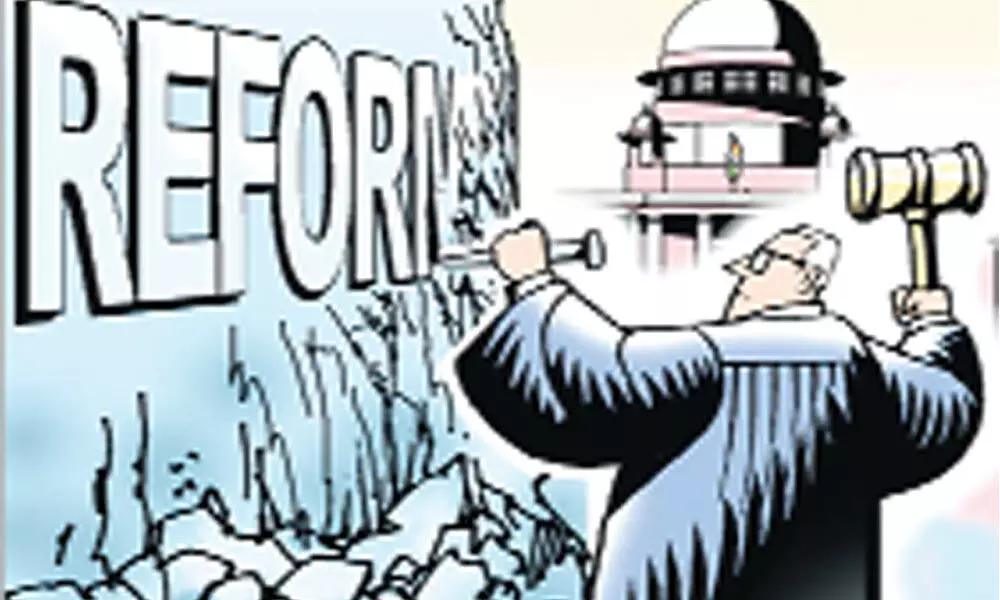Political reforms can revivify democracy

Representational image
We are living in times of intense upheavals and dramatic developments.
We are living in times of intense upheavals and dramatic developments. In the past one year, India has not simply locked horns with the deadly Covid-19 pandemic but has also fought economic crises and witnessed unprecedented political activity, with institutions ranging from the judiciary to the media consistently making headlines for controversial reasons.
In such extraordinary times, it is, perhaps, essential to rethink our polity itself as well as the relationship between leaders and followers, authorities and the people. Unexpected transformations require political reform and it is the need of the hour for the Indian polity to uncover new horizons of democratic and political activity.
First of all, there is an urgent need to reimagine the multi-party system at large. While the diversity of the country needs to be articulated in the polity, the current parliamentary system observes a usually divided opposition against an often put-together government. The division of votes is so much that both the government and the opposition lose immediate relevance. For instance, in the 15th Lok Sabha, the Indian National Congress-led United Progressive Alliance won 262 seats and had to be supported by several other ideologically diverse parties to get to the tally of 322 seats to form the government. In the current Lok Sabha, the government may have secured a majority, but the opposition is splintered with the largest opposition party, the Congress, reduced to 44 seats against the Bharatiya Janata Party's tally of 303 seats.
As the Election Commission declared in 2019, India has a total of 2,293 political parties and this inevitably complicates any idea of a stable government or opposition due to fragmentation of the election mandates. Messy situations of vote-splitting can be prevented by limiting the number of political parties which can contest elections. Fewer parties in the running with clear ideological underpinnings will not just reduce election costs but also lead to fewer situations of horse trading and defections, since political stands will no longer be a matter of circumstance but of declared allegiance. This would lead to formations of strong governments and oppositions and more consolidated articulations of the people's mandate.
It is also crucial to rework our institutional structures. Our institutional architecture must be rebuilt to place constraints on immoderate exercises of power and lack of accountability by authorities. For instance, once elected, governments, Members of Parliament and Legislative Assemblies hold massive power for at least five years and there's no direct way for voters to put them to test in case of misuse of powers till elections arrive. Accordingly, the Right to Recall law, which allows for the removal of heads of panchayats through verified votes by people in certain states of India after a lock-in period of one or two years, must also be implemented at the national level to ensure a more accountable legislature. This would ensure an immediate sanction against non-performance and also greater power to the people to hold their representatives accountable.
The other reforms needed are in the realm of electoral politics and finance. To ensure cent percent voting, the voting process must be simplified and made more accessible to people. This would include increases in the number of polling booths, greater enrolment of voters and a quick and simple voting process. Indian voters staying away from their constituencies and NRIs should be allowed to cast their votes through electronically transferred ballots. This is likely to invigorate representation and make elections a lot more inclusive. In terms of spending by political parties, there should be stricter regulations on expenditure with details of donations and contributions to fund a party's campaigns being made compulsory to submit, alongside a cap on the expenditure and a limited campaign time for the election cycle. Greater financial transparency and a regulated monitored campaign can create conditions for free, fair and credible elections.
It is simultaneously necessary to have greater independence for institutions – India could certainly use an independent central bank, with powers to disagree with the ruling dispensation over economic matters, for example. Similarly, an independent media and lesser restrictions on the internet can allow for honest critiques of governments, greater expressing of opinions on mainstream cultures and increase citizen participation in the formation of popular public narratives. Autonomous institutions are a central feature of powerful democracies and institutional freedom is a crucial arena for immediate reform.
Most fundamentally, a democratic upsurge can occur when the people are inundated with greater rights and choices. Therefore, there should be a general attempt to increase the scope of not just fundamental rights but also measures like the Right to Information. Individual freedom and privacy must be protected at all costs, and authorities should commit to taking greater and frequent feedback from electors. All these ideas should go into the creation of a renewed, inclusive and progressive political and legal framework that enfranchises people to access new ways to individually and collectively engage with governance.
On the whole, political reforms are necessary and critically required to renew people's trust in authorities and institutions, by mandating their accountability and transparency. Change alone endures in a fickle world, and Indian politics could certainly enjoy changes that offer the people greater dignity, freedom and security.
(The author is Chief Impact Officer at Recykal Foundation)

